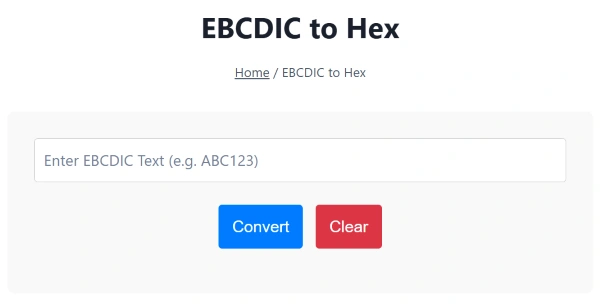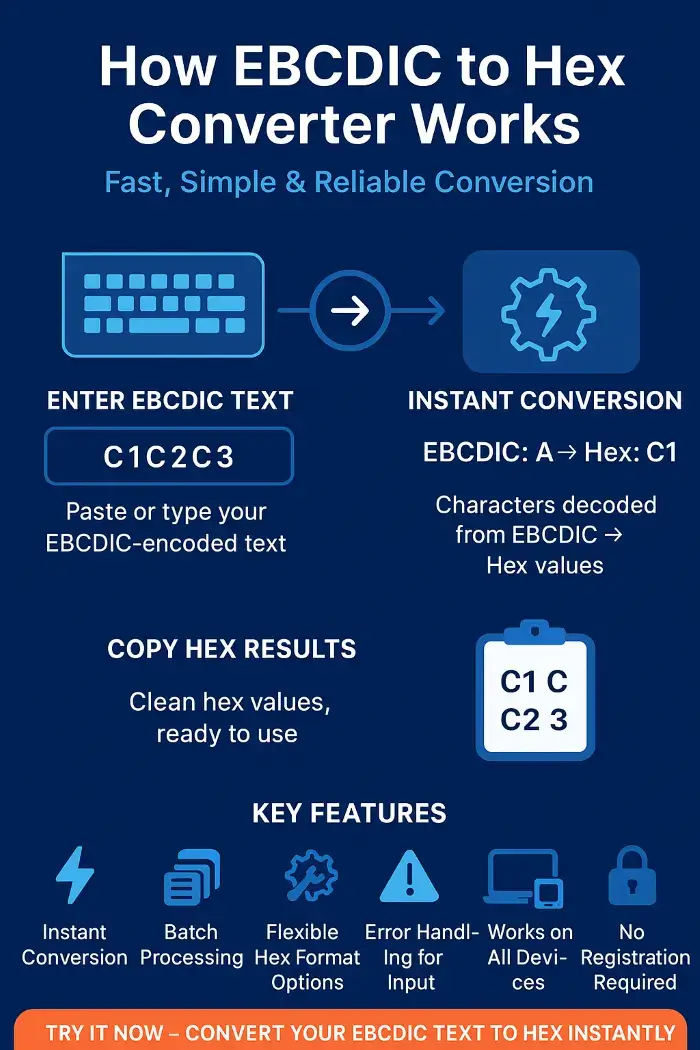EBCDIC to Hex
Reverse Conversion Tool: Hex to EBCDIC Converter
Convert EBCDIC Text to Hexadecimal Values Instantly
Transform your EBCDIC (Extended Binary Coded Decimal Interchange Code) text into hexadecimal format with our free, fast, and accurate online converter. Perfect for mainframe developers, system administrators, and data analysts working with legacy IBM systems.
The EBCDIC to hex converter image is shown below:

What is EBCDIC?
EBCDIC is an 8-bit character encoding standard created by IBM in the 1960s for mainframe and midrange systems. Unlike ASCII, EBCDIC assigns different byte values to characters, which makes direct interoperability difficult without proper conversion tools.
If you need ASCII conversions as well, the ASCII to Hex Converter or Hex to ASCII Converter can help when working across multiple encoding systems.
Why Convert EBCDIC to Hexadecimal?
Converting EBCDIC to hex is essential for several technical scenarios:
System Integration: When interfacing modern systems with legacy IBM mainframes, hex representation provides a clear view of the actual byte values being transmitted or stored.
Data Analysis: Hexadecimal format makes it easier to analyze and debug data transmission issues between different encoding systems.
File Processing: Many data migration projects require understanding the exact hex values of EBCDIC-encoded files to ensure accurate conversion.
Debugging: System administrators often need to examine hex dumps of EBCDIC data to troubleshoot character encoding problems.
For additional decoding or bit-level analysis, use the Hex Bitwise Calculator or Hex Shift Calculator.
How to Use Our EBCDIC to Hex Converter?

- Input Your EBCDIC Text: Paste or type your EBCDIC-encoded text into the input field
- Convert Instantly: Click the convert button to see your hex results immediately
- Results: Copy converted hex values for use in other applications
Need reverse conversion? Use the Hex to EBCDIC Converter.
Key Features of Our Converter
Instant Conversion: Get immediate results without waiting for server processing
- Batch Processing: Convert multiple lines or large blocks of EBCDIC text at once
- Format Options: Choose from various hex output formats to match your specific needs
- Error Handling: Clear error messages help identify invalid input characters
- Cross-Platform: Works on desktop, tablet, and mobile devices
- No Registration: Use the tool immediately without creating an account
If you need to interpret hex directly as decimal, try the Hex to Decimal Converter or Little Endian Hex to Decimal tools.
Understanding EBCDIC Character Mapping
EBCDIC uses different byte values compared to ASCII for the same characters. For example:
| Character | ASCII Hex | EBCDIC Hex |
|---|---|---|
| A | 41 | C1 |
| 0 | 30 | F0 |
| Space | 20 | 40 |
This difference is why conversion tools are critical when processing or migrating EBCDIC-encoded files.
For other encoding conversions, explore Hex to UTF8 Converter, UTF8 to Hex, or Base64 to Hex Converter.
Common Use Cases
Mainframe Data Migration: Converting legacy EBCDIC databases to modern ASCII-based systems requires precise hex analysis to ensure data integrity.
File Format Analysis: Understanding the hex structure of EBCDIC files helps in creating accurate parsing routines for data extraction.
System Documentation: Technical documentation often requires hex representations of EBCDIC control characters and special symbols.
Quality Assurance: Testing teams use hex conversion to verify that character encoding transformations maintain data accuracy across different systems.
Technical Specifications
Our converter supports all standard EBCDIC code pages, including:
- CP037 (US/Canada)
- CP500 (International)
- CP1047 (Open Systems)
- CP285 (UK)
- CP284 (Spain/Latin America)
For deeper manipulation of converted hex values, try the Hex Two’s Complement Calculator, or Binary to Hex Converter.
Best Practices for EBCDIC Conversion
When working with EBCDIC to hex conversion, consider these important factors:
Code Page Identification: Always verify which EBCDIC code page your source data uses, as different code pages map characters to different hex values.
Control Characters: Pay special attention to control characters, as they may not have visible representations but still need accurate hex conversion.
Data Validation: After conversion, validate your hex output against known good samples to ensure accuracy.
Backup Original Data: Always maintain backups of original EBCDIC data before performing any conversions or migrations.
If you work with timestamps or numeric fields in EBCDIC data, you can convert hex outputs using the Hex to Date Converter or Signed Integer to Hex Converter.
FAQs About EBCDIC Text to Hexadecimal
Q1: Can I convert large EBCDIC files?
A1: Yes, our converter handles large text inputs efficiently. For extremely large files, consider breaking them into smaller chunks for optimal performance.
Q2: Does the converter support all EBCDIC variants?
A2: Our tool supports the most common EBCDIC code pages used in business applications. If you need support for a specific variant, please contact us.
Q3: Is my data secure when using this converter?
A3: All conversions happen locally in your browser. No data is transmitted to our servers, ensuring complete privacy and security.
Q4: Can I use this tool offline?
A4: The converter works entirely in your browser, so once loaded, it can function without an internet connection.
